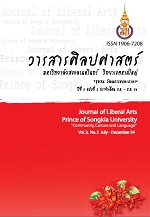Linguistic and Cultural Imperialism in English Language Education in Thailand
Keywords:
Linguistic imperialism, native-speakerism, English as a global language, language and power, critical applied linguistics, critical pedagogyAbstract
English has gained a position in the world as a global language. However, some scholars have argued that the hegemonic spread of English is a consequence of linguistic and cultural imperialism of mainstream native English speaking nations. In this paper, we draw on pedagogical practices of linguistic and cultural imperialism that promote dominant discourse and consequently cause learners to uphold the status quo of native speakers. In order to liberate English education in Thailand, we maintain that critical pedagogy, which relates classroom practice with social, political and economic realities, is supposed to help learners to build on their critical consciousness of English in the global context and its social, political and economic implications. We also suggest English language education in Thailand go beyond native and non-native dichotomy and recognize the role English plays in the world and consider the ways English is appropriated to suit local interests.Downloads
How to Cite
Issue
Section
License
The authors retain the copyright to their article but the Journal of Liberal Arts, Prince of Songkla University reserves the exclusive rights to first publication.





